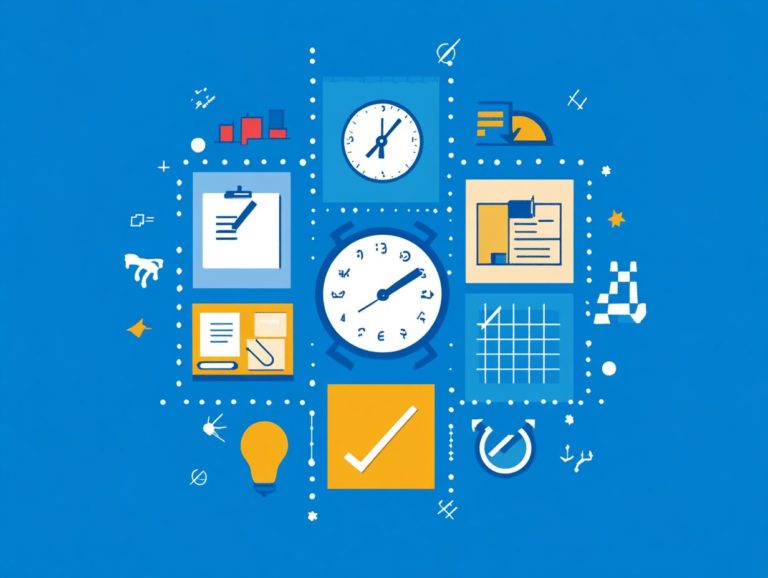Top Time Management Techniques for Students
In today s fast-paced academic landscape, mastering time management is essential for students like you who are juggling coursework, extracurricular activities, and personal commitments. You re about to discover effective techniques that can turn chaos into clarity.
From crafting detailed schedules and prioritizing tasks to minimizing distractions and leveraging productivity tools, you ll learn essential strategies designed to help you maximize your time.
By embracing these insights, you ll not only enhance your academic performance but also lay the groundwork for long-term success. Dive in to find out how to seize control of your time!
Contents
- Key Takeaways:
- 1. Create a Schedule or To-Do List
- 2. Prioritize Tasks
- 3. Eliminate Distractions
- 4. Break Tasks into Smaller Chunks
- 5. Use Time-Blocking
- 6. Set Realistic Goals
- 7. Take Breaks
- 8. Use Productivity Tools
- 9. Avoid Procrastination
- 10. Learn to Say No
- 11. Get Enough Sleep and Exercise
- 12. Use Waiting Time Wisely
- 13. Review and Reflect on Your Time Management
- 14. Seek Help When Needed
- 15. Celebrate Accomplishments
- Why Is Time Management Important for Students?
- Frequently Asked Questions
- What are the top time management techniques for students?
- How can creating a schedule help with time management for students?
- Why is setting priorities important for time management for students?
- What is the benefit of breaking tasks into smaller chunks for time management for students?
- Why should students avoid multitasking for effective time management?
- How can taking breaks improve time management for students?
Key Takeaways:

- Create a schedule or to-do list to stay organized and on track with tasks.
- Prioritize tasks to focus on the most important and urgent ones first.
- Eliminate distractions such as social media or TV to stay focused and efficient.
1. Create a Schedule or To-Do List
Creating a structured schedule or to-do list is crucial for you as a college student. It helps you effectively manage your time, prioritize important tasks, and balance your responsibilities across academics, extracurricular activities, and social life.
By integrating both digital calendars and physical planners, you can adopt a more comprehensive approach to scheduling. Digital calendars, with their automatic reminders and seamless accessibility, can serve as the backbone of your academic planning.
You can input deadlines for exams and assignments, ensuring that you never miss a due date. Using planners provides a tactile method of organization, giving you a dedicated space to jot down daily tasks and reflect on your progress.
To elevate your scheduling game, consider tapping into the academic resource center. They offer invaluable tips on time management and extra support for those challenging subjects, helping you have a better college experience.
2. Prioritize Tasks
Prioritizing tasks is essential for mastering time management as a college student, allowing you to hone in on crucial assignments and meet deadlines that significantly impact your academic success.
To navigate the complexities of your schedule, consider employing various methods, such as the Eisenhower Matrix, a tool for prioritizing tasks that categorizes them based on urgency and importance. This will help you determine what demands immediate attention and what can be planned for later.
Another effective technique is the ABC prioritization method, where you rank tasks as A (most important), B (important but not urgent), and C (least important). Grasping this distinction can profoundly elevate your productivity.
For additional support, don t hesitate to tap into the resources offered by the academic resource center. They can provide valuable guidance to help you optimize your task management strategies and achieve your academic goals with confidence.
3. Eliminate Distractions
To master efficient time management, you must actively eliminate distractions that can derail your focus during study sessions think social media and background noise that can negatively affect your mental health.
Establishing a dedicated study environment is crucial. Seek out a quiet space, free from interruptions, where you can fully immerse yourself in your work. Utilizing apps designed to block social media during study times can significantly curb the temptation to check notifications.
You might also consider techniques like the Pomodoro Technique, which divides your study time into manageable intervals. This method allows for intense focus followed by short breaks, enhancing your concentration and keeping your motivation high throughout the day.
By doing so, you maximize productivity while minimizing mental fatigue.
Start by creating your to-do list today and watch your productivity soar!
4. Break Tasks into Smaller Chunks
Breaking tasks into smaller chunks is an effective strategy that allows you to manage your workload more effectively. This approach makes assignments and group projects feel less overwhelming and far more achievable over time.
This method clarifies what actually needs to be done. It also helps alleviate that dreaded sense of being swamped by deadlines.
By breaking a large project into actionable steps like researching, drafting, and editing you can focus on completing one task at a time before seamlessly transitioning to the next. This significantly curbs procrastination, as those smaller tasks appear less daunting and much easier to tackle.
For instance, when gearing up for exams, you could dedicate 30 minutes each day to specific topics instead of cramming everything at once. This not only enhances your understanding but also boosts retention, making your study sessions far more effective.
5. Use Time-Blocking
Time-blocking is an effective planning method that can transform your college experience. It allows you to allocate specific time slots for various activities, boosting your productivity and focus.
By breaking your day into designated blocks, you ensure that each task receives the attention it deserves. Start by setting clear time limits for each task. This way, you know exactly how long you have to complete an assignment or prepare for an exam.
Regular breaks between these blocks are crucial; they help maintain your energy levels and prevent burnout. Utilize digital calendars for reminders to stay organized and accountable.
These tools ensure that you transition smoothly from one activity to the next without losing track of time.
6. Set Realistic Goals
Setting realistic goals is vital for your success as a college student. It offers you achievable targets and a clear roadmap to navigate your academic journey.
By using the SMART criteria, you can craft objectives that are specific to your field of study, measurable, and allow you to track your progress effectively.
- Specific: Define your goals clearly.
- Measurable: Establish criteria for tracking progress.
- Achievable: Set goals within your reach.
- Relevant: Align your goals with personal interests.
- Time-bound: Set deadlines to prioritize tasks.
Establishing a time-bound framework allows you to allocate your time wisely, enhancing your overall productivity and focus. Together, these principles provide you with the tools needed to transform your aspirations into tangible accomplishments.
7. Take Breaks

Incorporating regular breaks into your study sessions is essential for effective time management. It plays a significant role in your mental health and overall productivity in college.
Using methods like the Pomodoro Technique, which involves working in focused bursts followed by short breaks, can optimize your focus and motivation. These intentional pauses do more than just clear your mind; they help reduce stress and promote physical well-being by allowing your body to stretch and rejuvenate.
As you step away from your desk, you create an opportunity to reflect, regroup, and return to your studies with a fresh perspective. Don’t wait to take breaks your productivity hinges on it!
Ultimately, this balance cultivates a healthier approach to achieving academic success while nurturing a sustainable work-life dynamic.
8. Use Productivity Tools
Leveraging productivity tools such as time management apps and digital calendars can significantly enhance your ability to organize tasks and set reminders. Ultimately, this streamlines your academic workflow.
Among the many options available, apps like Todoist, Trello, and Notion stand out with unique features tailored to your needs as a student. For instance, Todoist gives you the power to create subtasks and categorize projects. Meanwhile, Trello s visual board system helps you track progress through different stages of completion.
Notion elegantly combines note-taking with task management, providing you with a multifaceted workspace. Digital calendars like Google Calendar help facilitate scheduling and send alerts for deadlines.
By integrating these tools into your daily routine, you can manage your time more effectively, ensuring that no assignment slips through the cracks. This keeps you firmly in control of your academic pursuits.
9. Avoid Procrastination
Avoiding procrastination is crucial for you as a college student. It helps you meet deadlines and fosters effective habits that can enhance your academic performance.
To tackle this common hurdle, developing a step-by-step plan is essential. Start by breaking down larger tasks into smaller, manageable goals; this way, the work won t feel so overwhelming.
Forming accountability partnerships with your peers can provide that extra motivation and encouragement. It creates a mutual sense of responsibility for each other s progress.
Incorporating time management techniques, like the Pomodoro Technique a time management method where you work for 25 minutes and then take a 5-minute break can also help you maintain focus and momentum. This turns daunting projects into achievable milestones.
By integrating these strategies into your routine, you can cultivate a more productive and less stressful academic journey.
10. Learn to Say No
Learning to say no is an essential skill for you as a college student. It helps you balance the demands of academics, extracurricular activities, and personal commitments without feeling overwhelmed.
This ability cultivates a healthier way to manage your time and energy, allowing you to focus on what truly matters. Recognizing your own limits is vital; overcommitting can lead to stress and negatively impact your performance.
Begin by evaluating your current responsibilities and identifying which tasks align with your goals. Utilizing a planner, whether physical or digital, can be incredibly helpful for tracking your commitments. Having that visual representation allows you to assess whether adding another role is realistic.
Practice self-awareness by considering how each opportunity fits into your broader life aspirations. Make informed decisions now to avoid stress later!
11. Get Enough Sleep and Exercise
Prioritizing enough sleep can supercharge your academic success! It directly impacts your mental wellbeing, productivity, and overall academic performance.
When you prioritize rest and physical activity, you often enjoy heightened focus, improved memory retention, and reduced stress levels. These create an optimal environment for learning.
Balancing a busy schedule can be a challenge, but establishing consistent sleep routines such as setting a regular bedtime and limiting screen time before bed promotes deeper, more restorative sleep.
Incorporating exercise into your day can be as straightforward as taking brisk walks between classes or scheduling short workout sessions. These activities not only break the monotony of study periods but also enhance your cognitive function by boosting blood flow to the brain.
12. Use Waiting Time Wisely
Utilizing waiting time wisely can significantly enhance your time management skills. It allows you to make the most of every moment, whether you re on the bus or waiting between classes.
By seizing these pockets of time, you can review notes from previous lectures to solidify your understanding, or dive into the required readings for upcoming classes to ensure you’re fully prepared. This is also a perfect opportunity to organize your tasks for the day.
Creating a prioritized to-do list provides a clear direction. By embracing these small yet impactful habits, you can transform stagnant moments into productive intervals, ultimately leading to improved academic performance and reduced stress.
13. Review and Reflect on Your Time Management
Regularly reviewing and reflecting on your time management practices is essential as a college student. This practice enables you to identify effective habits and make necessary adjustments to boost your overall productivity.
By looking at your own progress, you can discover which strategies work best for you, uncovering both your strengths and areas that need a little fine-tuning. This process involves stepping back to analyze how you allocate your time across various tasks, allowing you to recognize patterns of procrastination or doing things in a way that wastes time.
Reflecting on your experiences allows you to celebrate your successes like completing assignments ahead of deadlines while also acknowledging challenges, such as difficulties in prioritizing tasks. Armed with these insights, you can try new strategies that fit your needs, whether that means adjusting your study schedule, setting more realistic goals, or utilizing productivity tools to streamline your commitments.
14. Seek Help When Needed

Seeking assistance when necessary is a vital practice for you as a college student. It gives you the power to leverage the resources at your disposal, such as the academic resource center, and engage with accountability partners for added support.
Using tutoring services can help you significantly enhance your grasp of course material and sharpen your time management skills. These resources foster collaborative learning and create a supportive environment where you can openly discuss challenges. Recognizing that you are not alone in your academic journey instills a sense of motivation and accountability, enabling you to prioritize tasks and manage your schedule more effectively.
15. Celebrate Accomplishments
Celebrating your accomplishments, whether monumental or modest, is essential for nurturing your mental health and fostering a sense of success during your college journey. This practice significantly contributes to your overall well-being and self-esteem, helping you cultivate a growth mindset.
Rewarding yourself for reaching specific milestones like conquering a challenging project or acing an exam can be a delightful experience. Give yourself a well-deserved treat! Whether it s indulging in your favorite meal, enjoying a night out with friends, or simply savoring some well-deserved downtime.
Reflecting on your progress is equally important; consider journaling your journey or creating a visual representation of your achievements. Sharing your successes with peers not only amplifies your joy but also strengthens your connections, fostering a supportive environment that encourages everyone to thrive.
Why Is Time Management Important for Students?
Time management is essential for you as a student, enhancing not only your academic success but also fostering a balanced lifestyle that nurtures your mental health and overall well-being.
By organizing your schedule effectively, you can carve out dedicated time for studying, which helps you grasp complex concepts and elevate your grades. This proactive approach cultivates a sense of accomplishment and alleviates the anxiety that often accompanies pressing deadlines.
When you become adept at managing your time, you ll find it easier to juggle classwork, part-time jobs, and social activities, leading to a more fulfilling college experience. Managing your time well helps you build relationships and enjoy hobbies both of which are invaluable for your personal growth.
Ultimately, mastering time management can make your college years exciting and less stressful!
What Are the Consequences of Poor Time Management for Students?
The consequences of poor time management for students can be quite severe, leading to increased stress, diminished academic performance, and a negative impact on mental well-being.
When deadlines are consistently missed, you may find yourself wrestling with a mountain of assignments. This can quickly spiral into disorganization. Not only does this result in disappointing grades, but it also sows seeds of defeat that can gradually erode your confidence.
As anxiety levels rise, your ability to concentrate may falter, further hindering your performance. Relying on last-minute efforts can develop habits that can carry over into your job, making it challenging to meet professional expectations.
Ultimately, neglecting time management disrupts not only your educational pursuits but also fosters a pervasive sense of overwhelm that can linger into adulthood.
How Can Students Overcome Common Time Management Challenges?
You can conquer common time management challenges by embracing effective habits, seeking out accountability partners, and integrating effective planning methods into your daily routine.
By prioritizing tasks with to-do lists or digital planners, you create a visual roadmap that gives you the power to manage your time more efficiently. Consider setting specific time blocks for studying; this can help minimize distractions and cultivate a focused environment.
Utilizing study groups or mentors not only provides essential encouragement but also instills a sense of responsibility, significantly reducing the likelihood of procrastination. Exploring tools like timers or productivity apps can enhance your ability to track progress, ensuring that each study session contributes meaningfully to your academic journey.
What Are Some Additional Time Management Tips for Students?
In addition to foundational strategies, there are several time management tips that can significantly enhance your productivity during study sessions and daily activities.
Consider implementing the Pomodoro Technique; this approach involves studying for 25 minutes followed by a 5-minute break, helping you maintain focus and prevent burnout by breaking your study time into manageable intervals. Creating a visual calendar can also be beneficial, offering you a clear overview of deadlines and commitments, which in turn aids in prioritization and motivation.
Optimizing your study environment is key as well minimizing distractions, ensuring adequate lighting, and keeping your materials organized can create a more conducive atmosphere for learning. These supplementary strategies can collectively empower you to take control of your time, achieve your academic goals, and effectively reduce stress.
How Can Time Management Skills Benefit Students in the Long Run?
Imagine unlocking your full potential! Mastering time management skills can unlock remarkable long-term benefits for you, enhancing your academic success while contributing to personal growth and invaluable life skills.
These skills prepare you not only for the challenges of your education but also equip you with essential tools for your future career endeavors. By effectively balancing your responsibilities, you cultivate a sense of self-discipline that fosters reliability and accountability traits that employers deeply appreciate.
The ability to prioritize tasks enables better planning in both your personal and professional spheres, leading to reduced stress and improved decision-making. It s time to take charge of your future! The advantages of mastering time management extend far beyond the classroom; they permeate all aspects of life, shaping you into a well-rounded individual poised to tackle the challenges that lie ahead.
Frequently Asked Questions

What are the top time management techniques for students?
The top time management techniques for students include creating a schedule, setting priorities, breaking tasks into smaller chunks, avoiding multitasking, taking breaks, and learning to say no.
How can creating a schedule help with time management for students?
Creating a schedule helps students plan out their time effectively, ensuring that they have enough time for all their tasks and responsibilities. It also helps them avoid last-minute cramming and reduces stress.
Start implementing these tips today and watch your productivity soar!
Why is setting priorities important for time management for students?
Setting priorities helps students focus on what really matters.
This way, they avoid wasting time on less important tasks.
What is the benefit of breaking tasks into smaller chunks for time management for students?
Breaking tasks into smaller chunks makes them easier to handle.
It allows students to make steady progress without feeling overwhelmed.
Why should students avoid multitasking for effective time management?
Multitasking can hurt productivity and increase mistakes.
Focusing on one task at a time helps students manage their time better.
How can taking breaks improve time management for students?
Taking breaks provides a chance to recharge and prevents exhaustion.
This leads to increased productivity and better overall time management.






